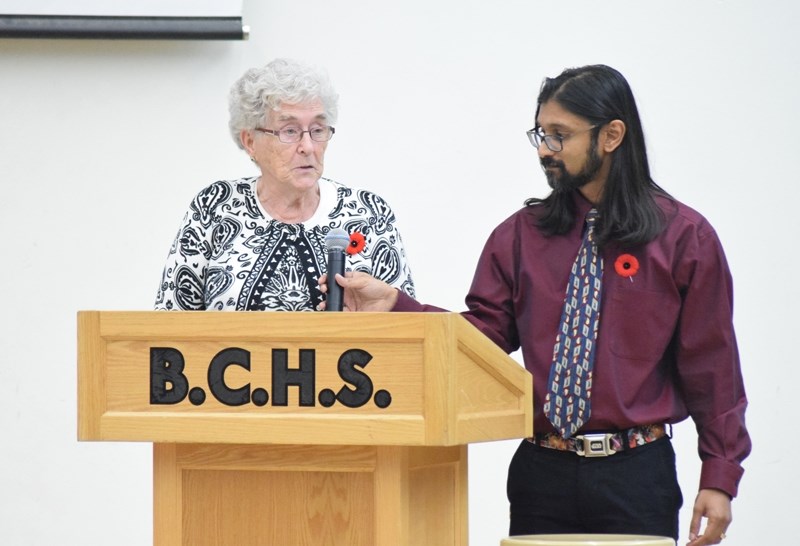Henny Mast remembers it well.
On May 10, 1940 the first Nazi German troops crossed the border of the Netherlands and they didn’t leave the area until the second half of 1944.
At least not in the area Mast lived with her family.
That is what she told a group of Barrhead Composite High School students during the school’s Remembrance Day ceremony on Tuesday, Nov. 10.
“I was very young when World War II first came to Holland and it was very long ago, but I remember it like it was yesterday,” Mast said, adding at first she and her brother looked at the German airplanes and parachutes in awe. “We thought it was a wonderful site as we pressed our faces against the windows.”
However, it didn’t take long until she realized that her family and her neighbours were in serious trouble.
Mast told the students how her parents then dragged them away from the window and she and her brother were told to hide under their beds.
Eventually Mast’s parents allowed the children to come out telling her Holland was at war.
“We really didn’t understand what that meant, but we soon found out,” she said. “The soldiers who had came down from the skies, were enemy soldiers and they were fighting our soldiers in the street.”
In the days which followed, Mast and her family attempted to hold the windows together by pasting strips of paper together across the windows to prevent the glass, which shattered from the vibration of the falling bombs.
Eventually, the fighting subsided and life under a Nazi occupied Netherlands went on.
The occupying force imposed a curfew on the residents with no one being allowed outside from dusk to dawn. Lights also had to be extinguished at night.
“We started to get used to the changes and we went about our lives as best we could,” she said.
For Mast and her brother that meant going back to school. A different school, one where students were no longer allowed to sing their national anthem and the Dutch flag was replaced with a Nazi flag.
Residents were also forbidden to wear orange, because the Dutch royal family, who had fled to England, surname was Orange.
The Dutch government refused to return and residents were governed by the German civilian governor, Arthur Seyss-Inquart, a Nazi from Austria.
“We were told to keep our ears and eyes open and talk to none other than your family just in case we would inadvertently talk about things the enemy soldiers shouldn’t know,” Mast said.
Food also became scarce. Food was rationed and of poor quality. What used to be white bread turned into a grey colour.
“We were issued food stamps, but it was a joke,” she said. “Because there was nothing to be had at the stores anyway.”
To survive residents sold their belongings to pay for food and planted vegetable gardens.
“My father had a few rabbits which he kept in the shed which he butchered for food, but someone found out about them and stole them,” Mast said, adding when the rabbits were gone her father would catch dogs and cats. “He would cut them up so they would look like a rabbit carcass and put them in a stew, hoping no one would be the wiser.”
Starting in 1941 the Nazi government started to round up Dutch-Jewish residents and deport them into various slave labour or concentration camps located across Nazi controlled Europe.
“Many Dutch people hid Jews. My family did too,” she said. “In our home they were hidden under the floor boards and one little boy was hidden in the back of our organ.”
At any given time four to six Jewish children would be hiding in the Mast family home. If there was a raid, Mast said her entire family, including the children, had a job to do in an effort to conceal their boarders.
“My brother’s job was to take as long as possible to answer the door. My mom and I would hide any evidence there was more than four people living in our home and my sister, who was three, was to dump all the toys on the floor,” she said, adding if her family had been caught it would have meant their lives.
Although newspapers and radios had been outlawed, the underground movement which Mast’s father was a part of, smuggled in small leaflet sized newspapers. It was through one of these papers Mast and her family first learned the Allied forces were coming to liberate them.
“The first army trucks and tanks were a wonderful sight,” Mast said. “The streets were lined with hundreds of people waving orange, or red, white and blue flags. Freedom had finally come.”
Mast concluded her talk by saying many teenagers today believe war is one big adventure.
“Don’t believe it. War is one long nightmare,” she said, one people have to be constantly vigilant about in order not to repeat it.
Mast recounted a story of how her 89 year-old father, long after the war and was living alone in Barrhead, woke up to the sound of squealing tires.
“He got up and found a Jewish star burning on his front lawn,” she said, adding it is an example of the evil that still exists today and that everyone has to do their upmost to fight it so history doesn’t repeat itself.



